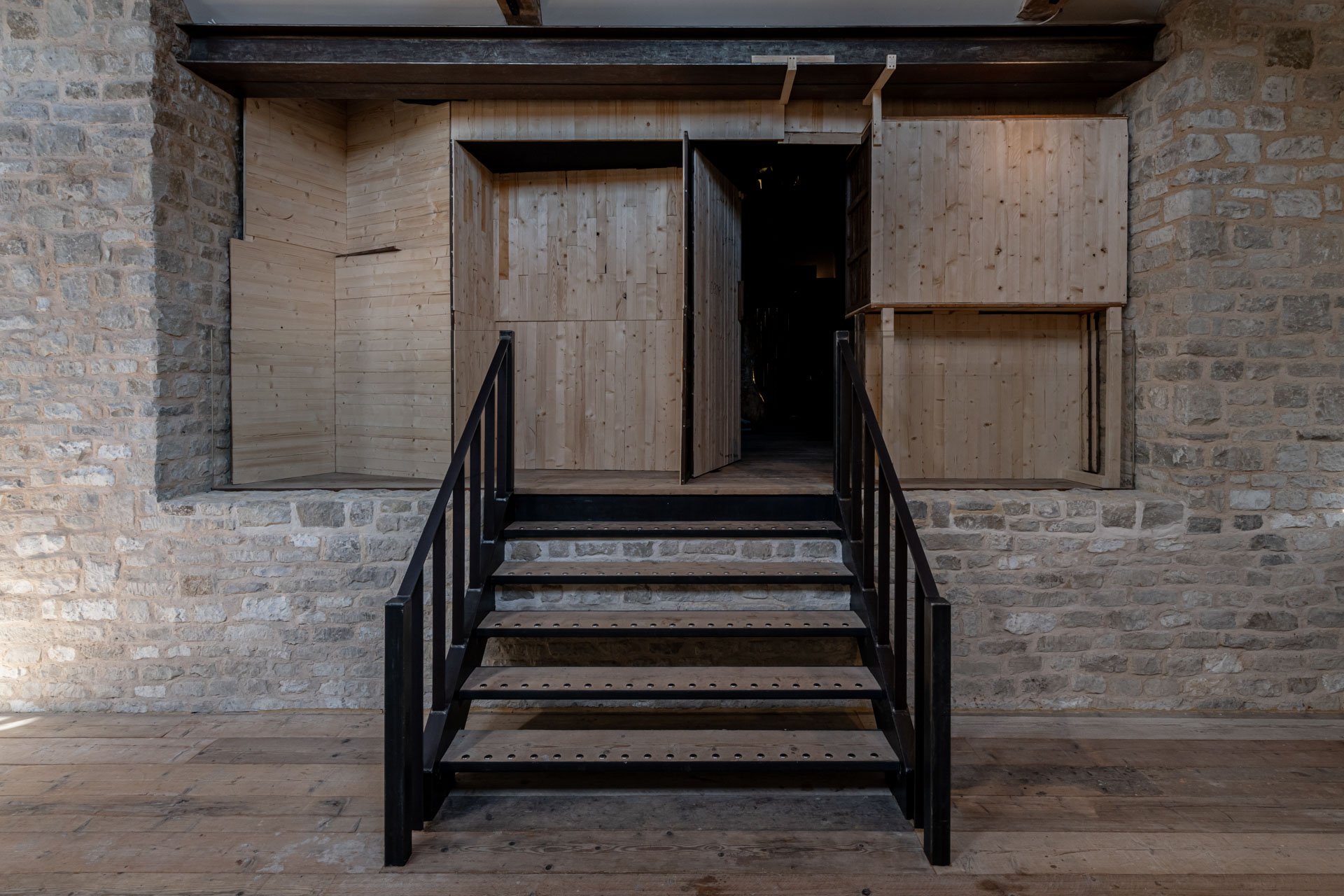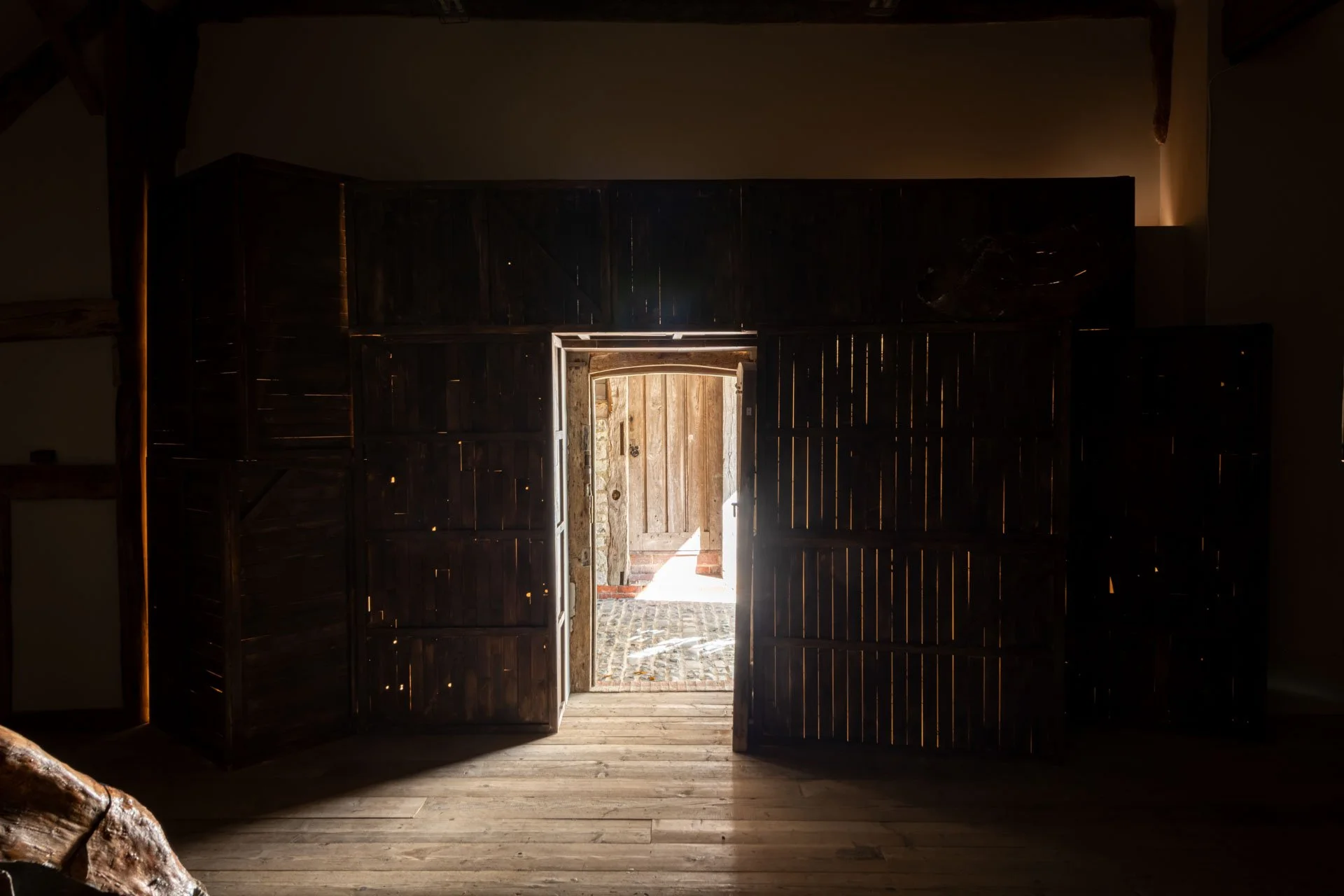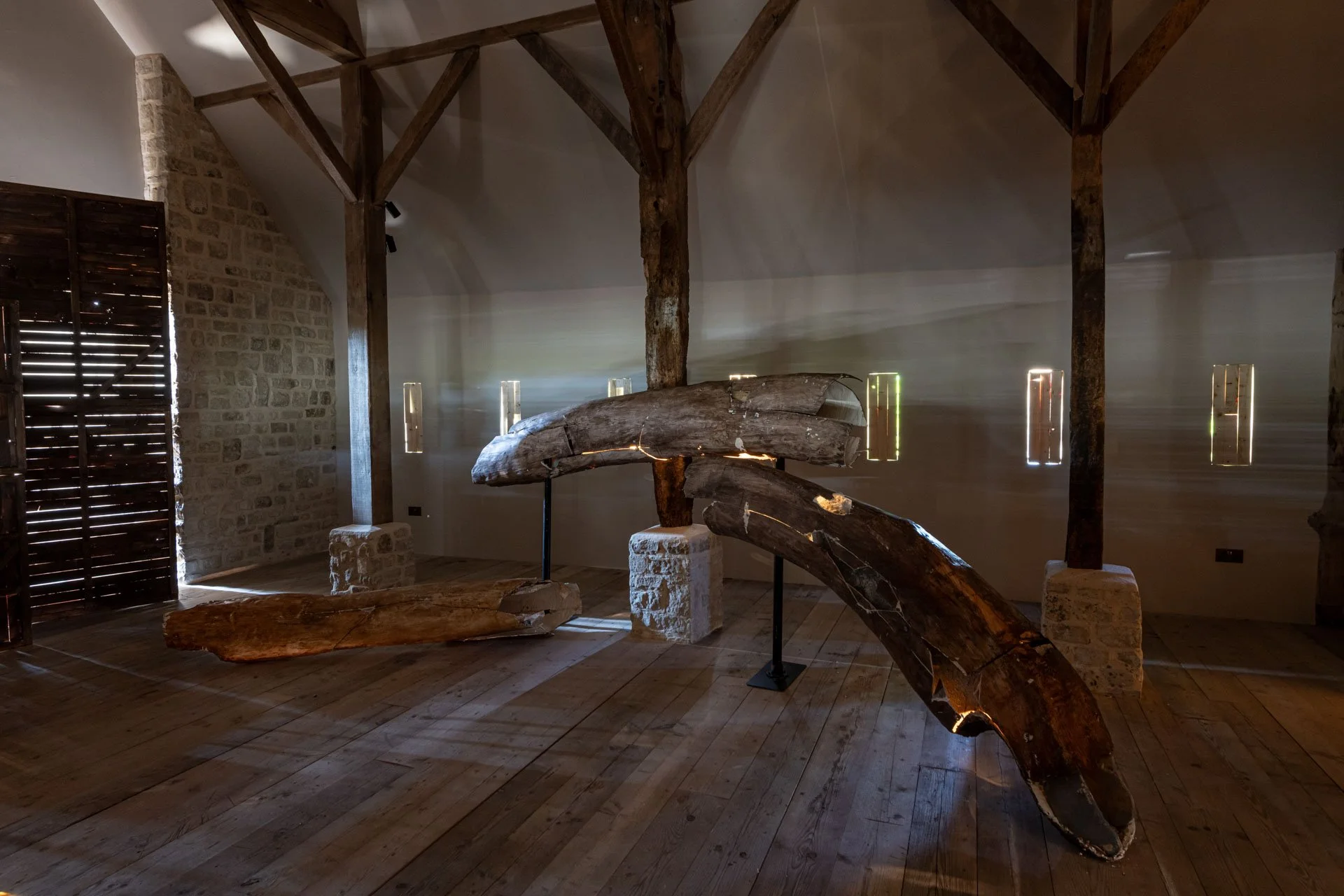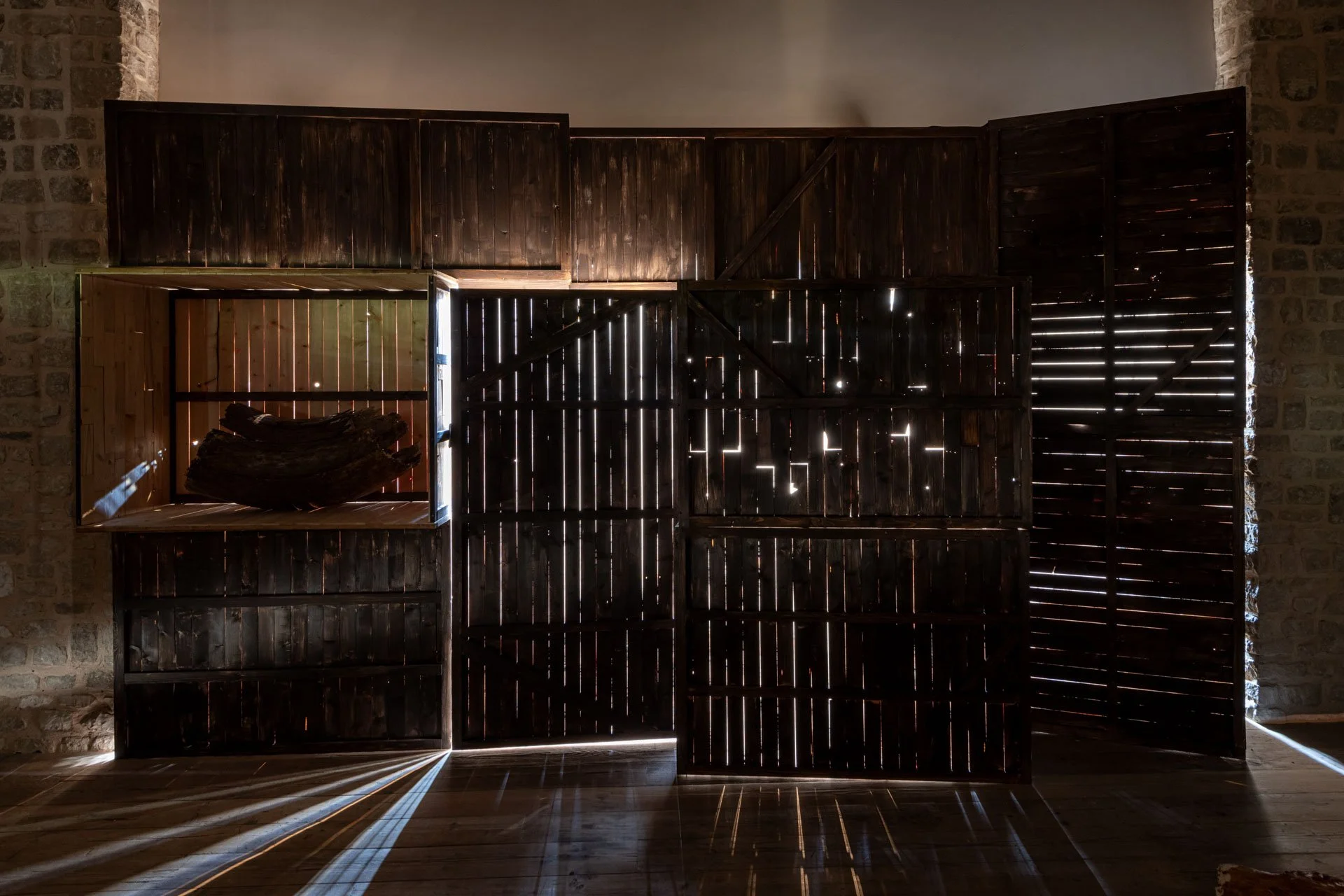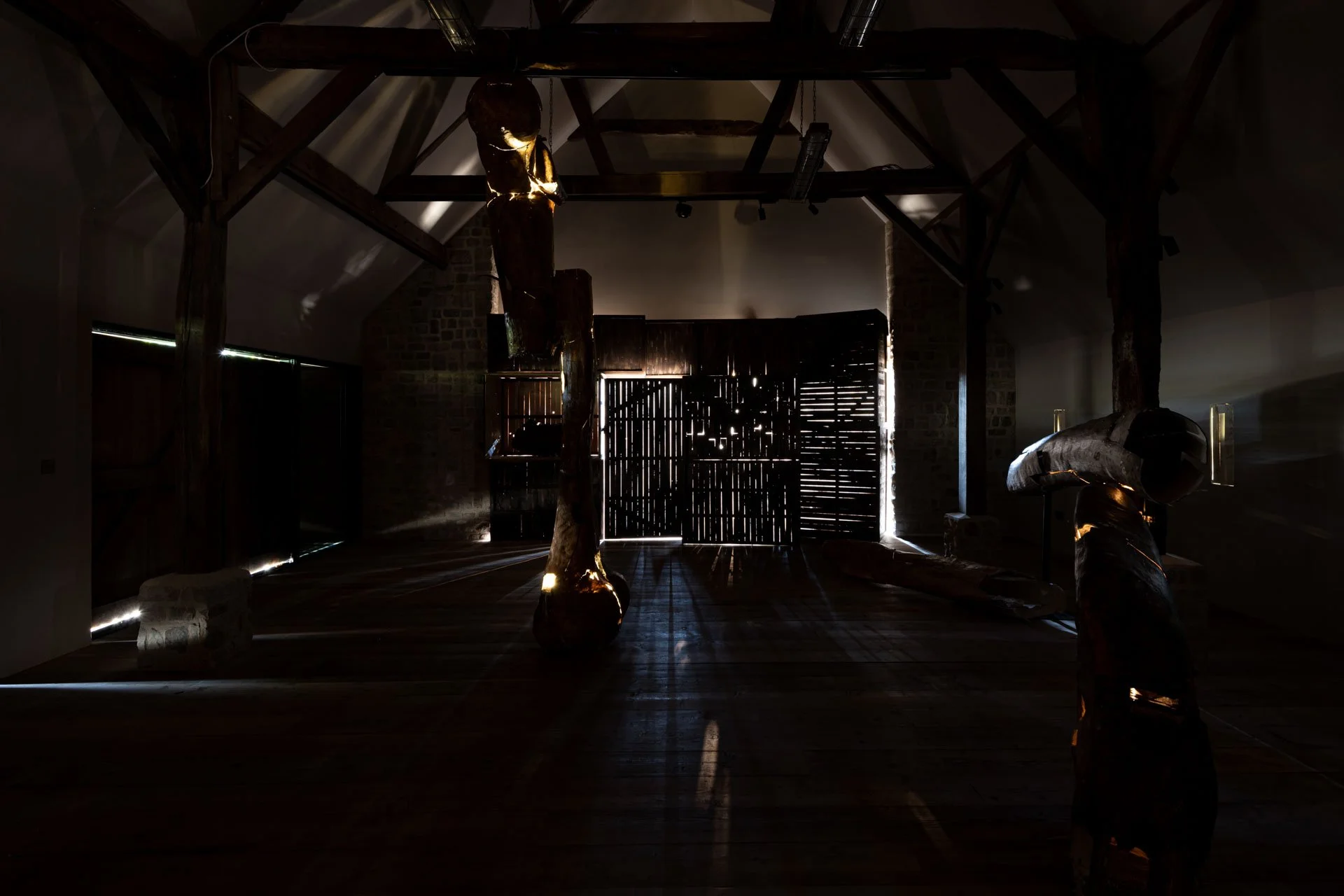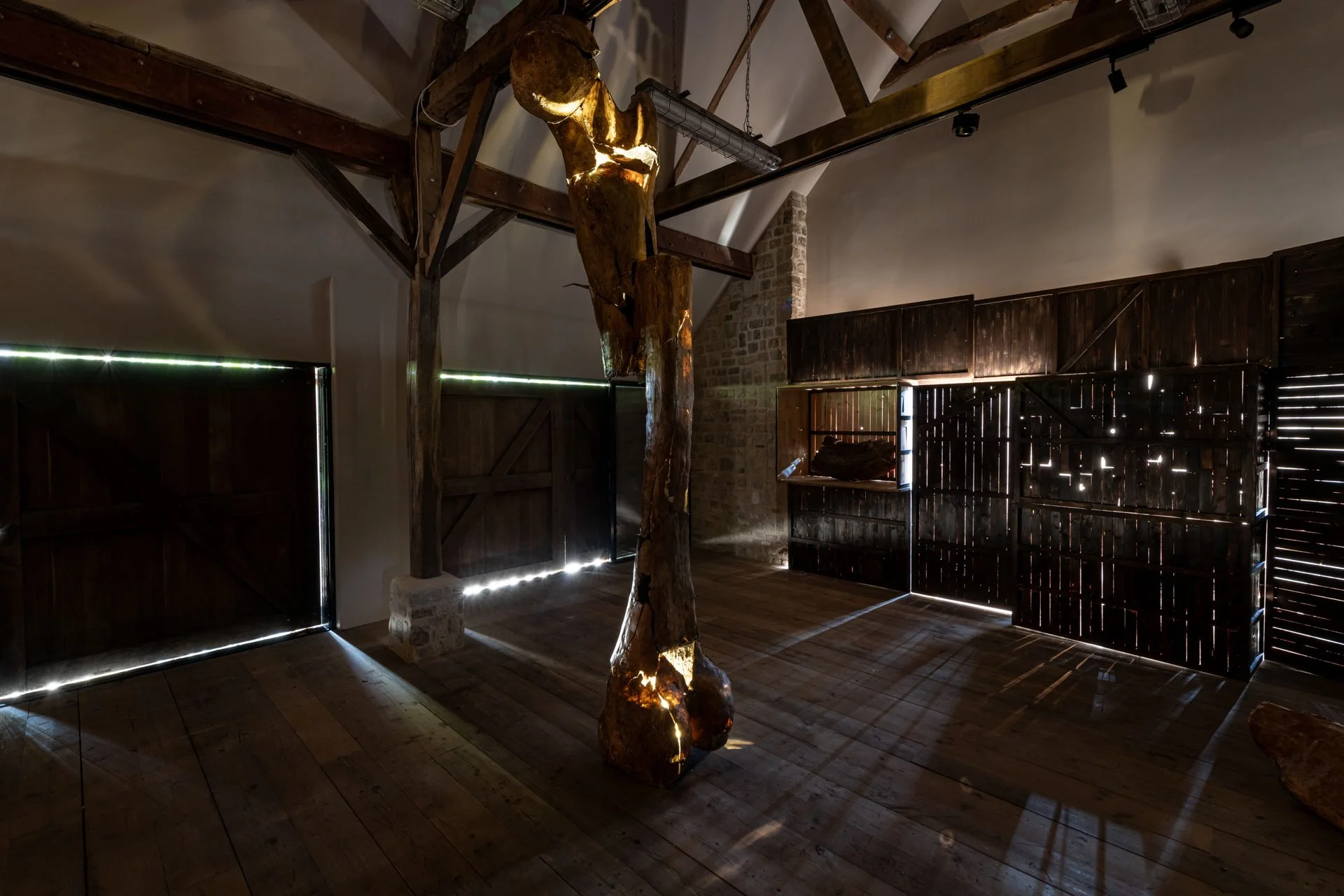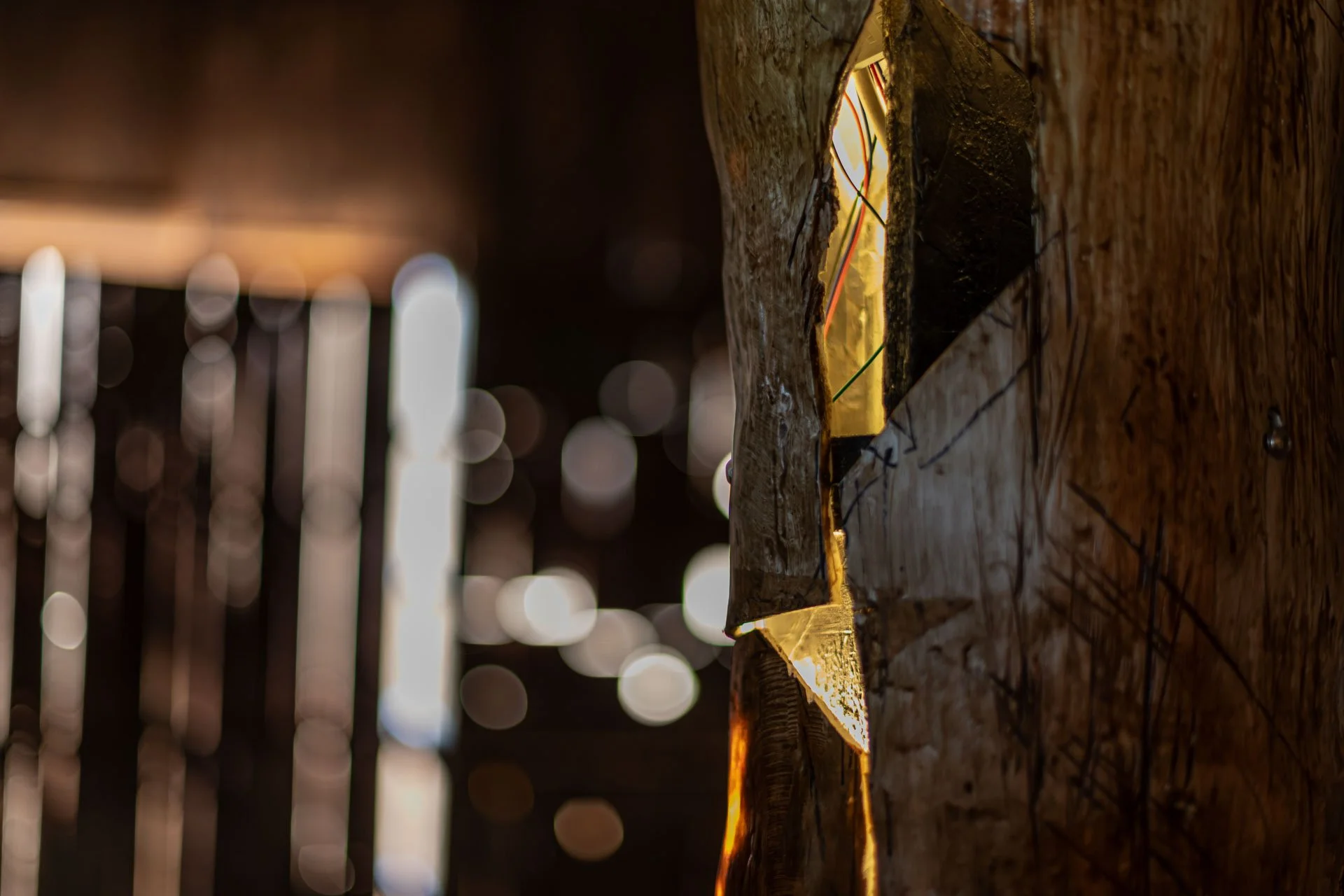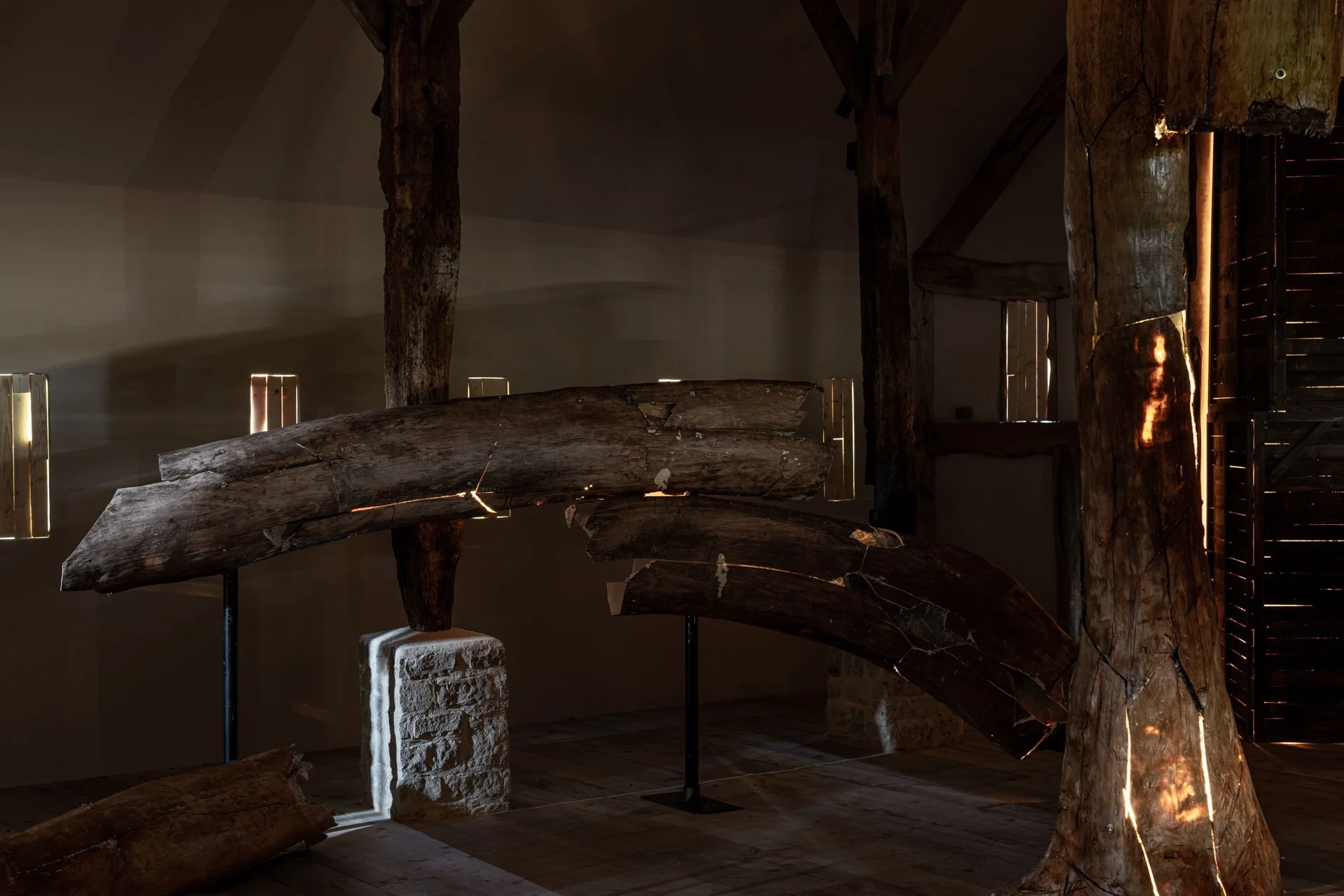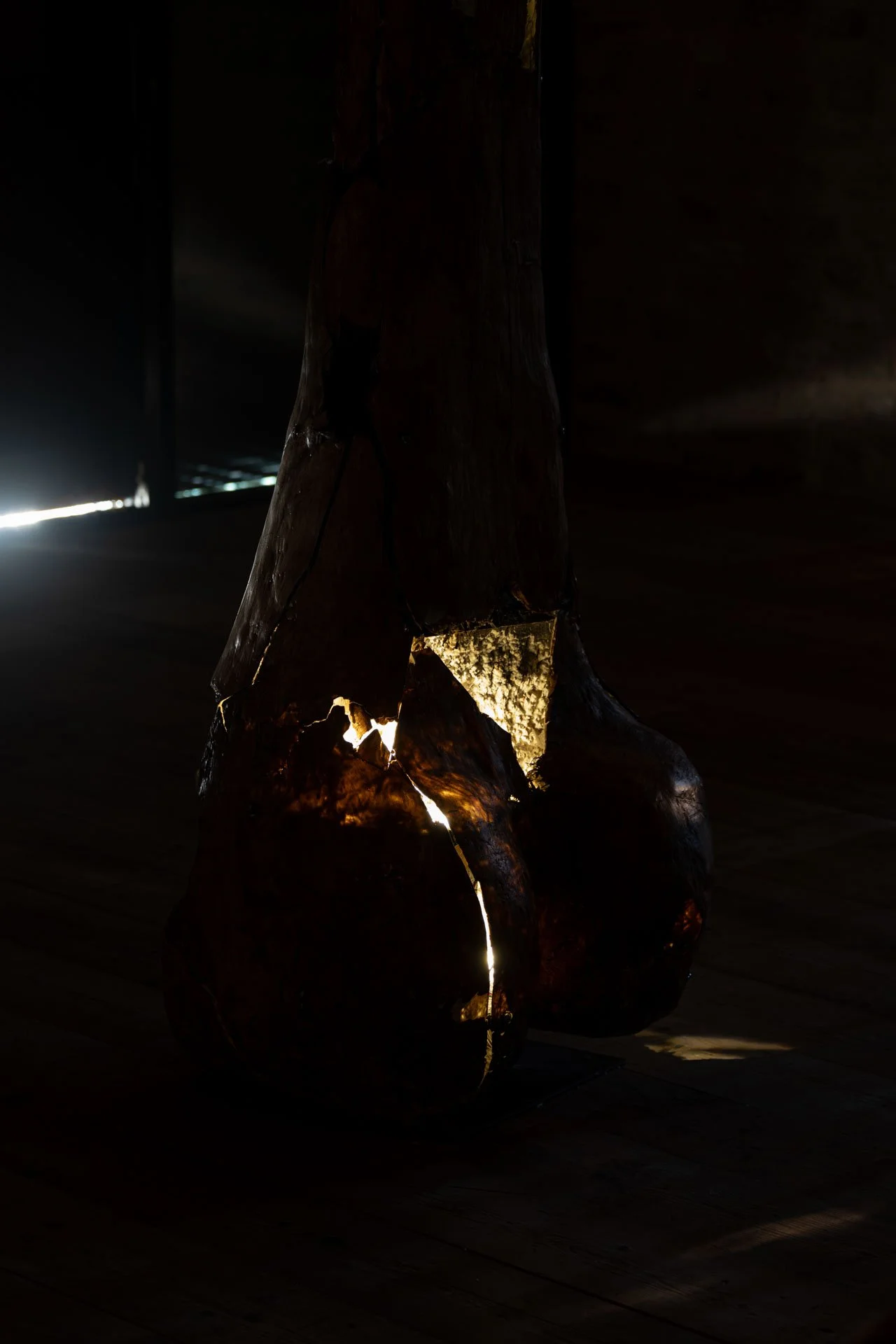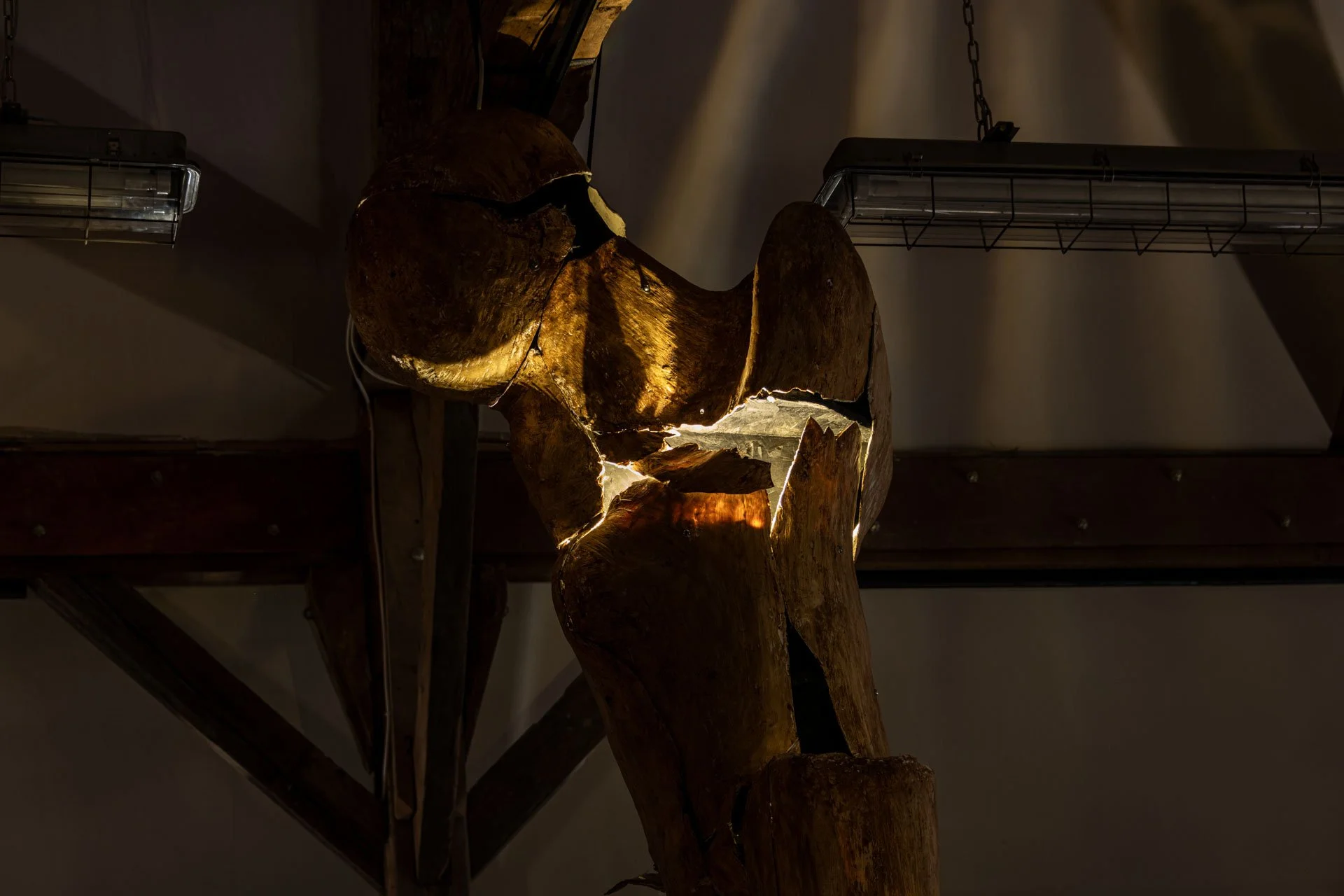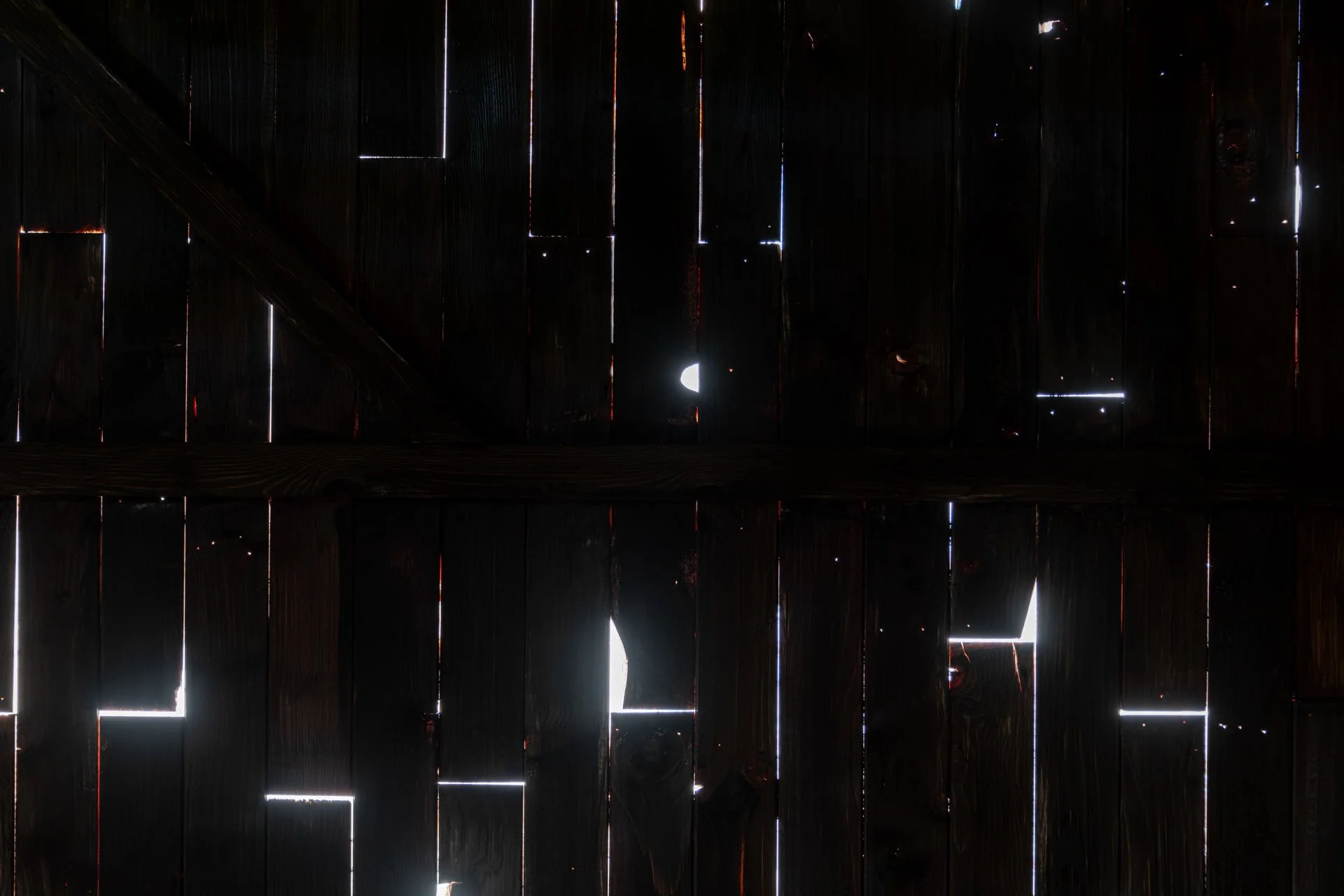By flipping it from exterior cladding to interior fill, Thompson stresses the material’s resilience and draws a parallel with museum practice, where replicas take on the same cultural weight as original artefacts.
At the centre of Roughcast, Chris Thompson’s new installation, stands an oversized bone, as tall as the adjacent column; it seems to prop up the ceiling. Modelled on a human femur but dramatically scaled up, it presents itself as something beastly, perhaps mythological. Its surface, finished like a museum replica, has been hacked to pieces, cracked and carefully pieced back together with sturdy bolts. Those very cracks expose its artifice: inside, the bone is made of Jesmonite and oriented strand board (OSB), filled with what looks like pebble dash. The illusion is clear, and that seems to be the point.
Anthropologist Margaret Mead once remarked that the first sign of civilisation was a 15,000-year-old fractured and healed femur discovered at an archaeological site. The femur, the longest and heaviest bone in the body, is vital to movement; in the animal kingdom a broken leg would usually mean death. A healed femur, however, shows evidence of care: that someone took time to tend to the injured, allowing them to recover. Thompson’s bone, visibly mended, echoes Mead’s observation. It speaks to custodianship and care, but also to the fragility and labour that such care entails.
Custodianship and care, particularly when played out through architecture, sits at the heart of Thompson’s practice. In his large-scale installations, he examines the systems by which we preserve objects of ‘historical importance’, reconstructing them in forms that resemble archaeological excavations or museum displays. These reconstructions are never seamless. His environments are knowingly thwarted, a little funny, even slightly antagonising, exposing the investigative labour of care itself.
This quasi-archaeological space also draws on myths surrounding the discovery of large animal bones. For centuries, the discovery of remains of mammoths, whales and other species were taken as proof of a race of giants. This assumption fed both folklore and colonialist narratives – from legends of titans that roamed Europe, to North American burial mounds, interpreted as proof of an ancient race by colonial settlers in a bid to disprove and erase the history of the land’s indigenous communities. Such stories reveal how science, myth, and ideology have long been intertwined. Touching upon these histories, Thompson alludes to how easily cultural memory and dominant historical narratives are fabricated.
Roughcast was conceived for Inspection Pit, a threshing barn turned garage turned artist project space in West Sussex that retains many of its original features, whether reconstructed or replaced with replicas. Thompson immersed himself in the details of the space, taking time and care to understand the building itself as an accumulation of materials over time. Within this setting, other bone fragments are scattered across the floor or placed within crate-like, backlit structures along the back wall of the space. Constructed from a mix of newly distressed timber and genuinely reclaimed wood, these crates set the backdrop for these skeletal remains, evoking in-between spaces such as archaeological digs or the storage rooms of a natural history museum.
The theatrics of the installation reflect Thompson’s background as a carpenter and a set builder. His environments are immersive and convincing, yet deliberately imperfect. Cracks, seams, and visible joins act as façades constructed to impress and mimic, while embracing the tension between immersion and exposure. They transport the audience into a fantasy world while reminding them what they see is an artifice.
A façade is never neutral; it shapes how we assign value to the thing it conceals or contains. Pebble dash, which Thompson now uses as a filling, was traditionally applied to working-class housing as a cost-effective protective render to hide imperfections. It has since become unfashionable and, ironically, extremely difficult and expensive to remove. By flipping it from exterior cladding to interior fill, Thompson stresses the material’s resilience and draws a parallel with museum practice, where replicas take on the same cultural weight as original artefacts. Thompson examines whether authenticity lies in the material itself or within the structures they are contained in – the plinth, the vitrine and the accompanying descriptive label.
Ultimately, Roughcast aims to make us complicit in activating these environments, inviting us to enquire how labour, historical narratives, and care operate in the objects and structures that surround us – what we know, what we remember, and what we choose to believe in.
Inês Costa
Curator, Focal Point Gallery
September 2025
-
Born in 1991 in Teesside, UK
Lives and works in London, UK2019-2023
MFA Fine Art, Goldsmiths, University of London, London, UK2010-2013
BA Hons Painting, Camberwell College of Arts, University of the Arts London, London, UK2012
Purchase College, State University of New York, Purchase, NY2009-2010
Cleveland College of Art and Design, Middlesbrough, UK -
Solo exhibitions
2025
Roughcast, Inspection Pit, West Sussex, UK
2024
Kit-Bash, Xxijra Hii, London, UK
2023
The Vessel, St Chad’s, London, UK
2022
Old Bones, Bobinska Brownlee New River , London, UK
2020
Instrument,Thames-Side Studios Gallery, London, UK
2019
👀, Brockley Gardens, London, UKGroup exhibitions
2024
North East Emerging Artists Award Show, Seaton Delaval Hall, Northumberland, UK
Dumping Ground,Regents Place, London, UK
2023
Winter Sculpture Park 2023, Bexley, London, UK
MFA Fine Art Degree Show, Goldsmiths, University of London, London, UK
Stable, BBNR Gallery, London, UK
2022
London Micro Sculpture Fair, Goldsmiths, University of London, London, UK
Present Tense, Goldsmiths, University of London, London, UK
Cosmoses,Xxijra Hii, London, UK
Dinosaur Coast, Eston Arts Centre, Middlesbrough, UK
2021
The Sompsons,CHEAP CHEAP Gallery, Birmingham, UK
FUNHOUSE,Chris Thompson Studio, London, UK
2019
MOSTYN Open 21, Mostyn, Wales, UK
Creekside Open 2019, Art in Perpetuity Trust, London, UK
2018
Pleasure Garden,21b Wykham Road, London, UK
Fatal Attraction,Thames-Side Studios Gallery, London, UK
Group Show, 41/42 Woolwich, London, UK
2017
ArtWorks Open, Barbican Arts Group Trust,London, UK
Changelings, The Flying Dutchman, London, UK
2016
Show Home, Safehouse 1, London, UK -
-
2024
Gilbert Bayes Sculpture Award, Royal Society of Sculptors, UK
2023
Wardens Prize, Goldsmiths, University of London, UK
2022
Developing Your Creative Practice Grant, Arts Council England, UK
2021
Oppenheim-John Downes Memorial Trust, UK2020
Gilbert Bayes Trust Scholarship, UK
Artists Support Grant, Freelands Foundation, UK2019
Prize Winner, Creekside Open, Art in Perpetuity Trust, UK2017
Grant Recipient, The Eaton Fund, UK -
Chris Thompson: Roughcast, Inspection Pit, West Sussex, UK, 2025.
Photo: Studio Adamson



